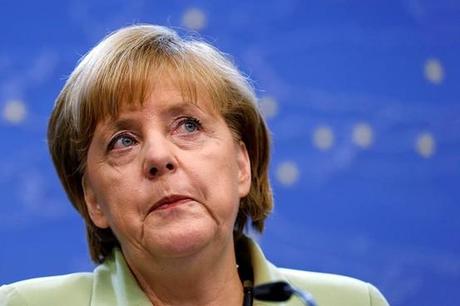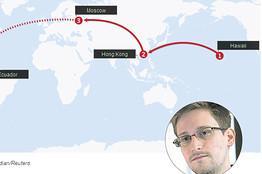By Sam Schechner in Paris and Harrieet Torry in Berlin / WSJ Online
The leaders of France and Germany raised the heat on the U.S. Monday as the fallout from whistleblower Edward Snowden‘s revelations intensified.
French President François Hollande demanded an explanation from Washington overallegations that the National Security Agency spied on European Union institutions. He also insisted the U.S. stop spying on European diplomatic outposts and indicated that coming free-trade talks between the EU and U.S. now hang in the balance.
Germany’s foreign ministry summoned the U.S. ambassador, with Chancellor Angela Merkel‘s government also demanding clarity on the matter.

German officials said that if the allegations were true, the NSA’s actions would constitute an unacceptable breach of trust between the close partners, while French counterparts called the alleged spying an unfriendly gesture that is unjustified among allies—even as some acknowledged that it isn’t uncommon.
Snowden on the Run
U.S. authorities sought to catch Edward Snowden before he reached his next goal: political asylum in Ecuador.

The comments come after German weekly magazine Der Spiegel reported over the weekend that the U.S. placed listening devices in EU offices in Washington, D.C., infiltrated computers there and electronically spied on EU bodies elsewhere. It cited secret documents obtained by former NSA contractor Mr. Snowden as the basis for its report.
The U.S. Office of the Director of National Intelligence said Sunday that the U.S. is responding to the EU privately about the allegations. The office’s statement didn’t address specific allegations but said, “We have made clear that the United States gathers foreign intelligence of the type gathered by all nations.”
But the allegations have been met with anger in Europe.
“We demand that this stop immediately,” Mr. Hollande said on the margins of an official trip in western France carried on French television. “There’s enough evidence for us to ask for an explanation,” he added.
French Foreign Minister Laurent Fabius will speak by phone Monday with U.S. Secretary of State John Kerry, and has also added a late-afternoon meeting with the U.S. Ambassador to France Charles H. Rivkin, a French foreign ministry spokesman said.
“There is no national-security justification for spying on diplomats and embassies of friendly countries,” the spokesman added.
There was a similar reaction to the report in Berlin, where the foreign ministry called the U.S. ambassador to Germany, Philip Murphy, for a meeting later Monday, a spokesman for the ministry said.
A U.S. embassy spokesman confirmed Mr. Murphy is scheduled to have a phone conversation with the political director of the Foreign Ministry later Monday. In the evening Mr. Murphy is scheduled to give a keynote address at a reception honoring his tenure in Berlin—he leaves his post on July 6.
Chancellor Merkel will seek to speak to President Barack Obama ”soon” about the allegations, her spokesman Steffen Seibert said, adding that the report had caused “astonishment” in Berlin. “We’re not in the Cold War anymore,” he said, adding that spying on friends is “not on.”
Mr. Seibert said the German government is talking to its European partners about the spying scandal.
In Brussels, a spokeswoman for the European Commission, the EU’s executive arm, said a rapid clarification from the U.S. was needed and that the EU’s High Representative for foreign affairs had raised the matter with U.S. Secretary of State John Kerry.
“This is disturbing news, if proven true it demands full clarification,” commission spokeswoman Pia Ahrenkilde Hansen told reporters. “The EU is now expecting to hear from the U.S. authorities, let me state clearly clarity and transparency is what we expect from our partners and allies, this is what we expect from the U.S.”
The spying allegations come just days before trade negotiations between the U.S. and the EU are scheduled to start on July 8.
But Mr. Hollande raised doubts about the talks, saying there should be no negotiations with the U.S. on any matter until it guarantees that it is not spying on its European allies.
“We cannot have any negotiations or deals in any domain unless we’ve gotten these guarantees for France, and that goes for the EU as well,” Mr. Hollande said.
German spokesman Mr. Seibert said his country still wants to pursue the planned free trade agreement “but on the basis of trust.”
Commission spokeswoman Ms. Hansen said full disclosure was needed before talking about whether the talks would be affected.
“We need for the Americans to come clean, clarify matters regarding what’s in the press,” she said. “We’re not going to jump the gun and speculate.”
On Sunday evening, EU Justice Commissioner Viviane Reding said at a public forum in Luxembourg that “we cannot negotiate over a big trans-Atlantic market if there is the slightest doubt that our partners are carrying out spying activities on the offices of our negotiators.”
Following the allegations, some in France have called for a way to protect Mr. Snowden, and other whistleblowers who leak information in public or to the press.
French technology minister Fleur Pellerin said Monday that it makes sense to worry about the lack of an international whistleblower status to protect people who reveal information on activities they believe to be illegal.
“There is no international statute that allows for the protection of these people if necessary,” Ms. Pellerin said. “I think it’s a good occasion to get into the subject, which is a gray area of international law.”
France’s green party Monday called on Mr. Hollande to grant Mr. Snowden political asylum. “It would allow France to remind the world that it intends to protect every whistleblower, regardless of his or her nationality,” said the French political party, Europe Ecology—the Greens.
Spying between allies isn’t uncommon some French officials said. “It wouldn’t be the first time that has happened in history,” Ms. Pellerin said in a TV interview. “Even if it’s not necessarily a friendly gesture from an ally, it’s nothing new.”

